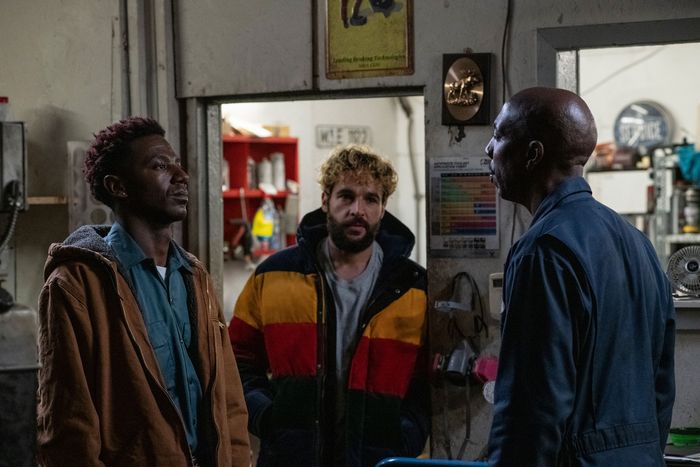
On the Count of Three opens with a petrified Jerrod Carmichael and Christopher Abbott holding guns to each other’s faces, desperately affirming their friendship while barely holding back panic. It’s an in medias res opening that’s become a little too commonplace in TV pilots lately, but it’s also a promise that On the Count of Three isn’t messing around with its premise. The film, which is Carmichael’s feature directorial debut and written by Ramy co-creators Ari Katcher and Ryan Welch, is about two men who make a suicide pact and then spend one last day together looking for closure, or novelty, or something before they die together. Whether it’s going to be able to pull this gambit off or not, the film makes clear up top that its characters are serious about their planned end, and that the comedy it intends to offer is bitterly dark.
On the Count of Three works more than it doesn’t, though the film, which is reaching theaters almost a year and a half after its Sundance 2021 debut, feels like something that its director and star has already outgrown. Last month, Carmichael released the vulnerable and intensely personal stand-up special Rothaniel, in which he delved into his family, the image of masculinity he internalized, and his identity as a gay man. A few days later, he delivered a masterful monologue while hosting Saturday Night Live for the first time. In a recent interview with Time, Carmichael noted a change in the way he holds himself since coming out: “I told a friend recently that I take better pictures after coming out because I’m not scared of looking gay. I think I move better, move freer. Little things. I don’t worry about being a man anymore. I accept that I am. I don’t have to perform it.”
It’s something that comes to mind watching his graceful ease on that SNL stage, and again while watching him as Val, a morose landscape-supply company worker who’s pushed over the edge by the news that he’s gotten a promotion. There’s nothing comfortable about Carmichael onscreen in On the Count of Three. That owes something to his decision to portray Val’s state of mind through flat affectlessness, and something else to the film’s self-awareness about its own provocations. On the Count of Three brings to mind fellow comedian Bobcat Goldthwait’s work as a filmmaker, which has also often found its way back to sincerity from an outrageous setup. Carmichael has always been interested in material that other creators might consider too fraught — his NBC show, over its three-season run, regularly delved into topics that weren’t exactly network-sitcom standard. But there’s an instigative quality to On the Count of Three that feels a little juvenile in context, as though the premise were a way of sidling up to themes of mental illness, depression, and fatherhood when the film could have just tackled them headlong.
Val, who’s been thrown into an existential panic by the news that his girlfriend (The Carmichael Show alum Tiffany Haddish) is pregnant, feels hopeless about the future. His best friend Kevin (Abbott), who’s dealt with a lifetime of mental-health struggles, is already in a treatment facility after a suicide attempt earlier in the week. A bleached-blond Abbott portrays Kevin as a tragic meathead who has effectively been waiting all his life for someone to join him in his despair. Once Val breaks him out, and the two agree to wait until the end of the day to do the deed, they find themselves driving through a spectacularly ugly swatch of tristate exurbs looking for something to mark the occasion. This fumbling search for closure or meaning is where the film is at its best and funniest, as the pair talk about why daytime behind a strip club is a handy spot for a dual suicide, argue over the appropriateness of Papa Roach as a soundtrack, and then waver between trying to stage a reconciliation between Val and his abusive father Lyndell (J. B. Smoove) and tracking down and murdering Dr. Brenner (Henry Winkler), the child psychiatrist who molested Kevin.
All of the miseries that are revealed as the two men go about their day may be bleak, but the humor comes from the small indignities inflicted on them even as they try to go out with a bang — Dr. Brenner being out until later in the day, Lyndell having a Big Mouth Billy Bass on the wall of the garage where he works that keeps going off at inappropriate moments. On the Count of Three eventually, inevitably paints itself into a corner, and ends on an unsatisfying note, but that doesn’t really matter. It’s a minor effort from an artist who’s already moved on to bigger and better things.
More From This Series
- The Thriller Drop Is a Perfect Addition to the Bad-First-Date Canon
- The Accountant 2 Can Not Be Taken Seriously
- Another Simple Favor Is So Fun, Until It Gets So Dumb


